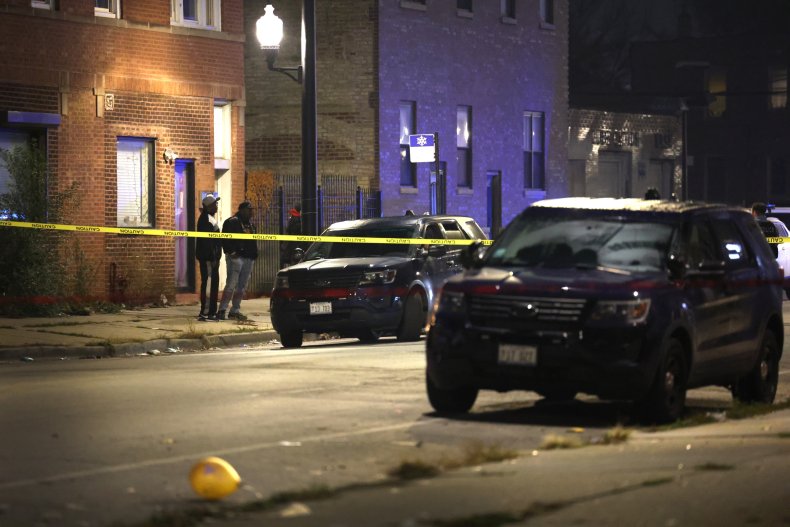Democrats Depend on Black Voters But Do Nothing for Us. Here's How to Fix That | Opinion
It's no secret that Democrats have long controlled major coastal cities of the United States. Politicians running as Republicans have not won city-wide election in any of the 10 largest cities since Michael Bloomberg's first election as New York City mayor, and in many cities, it's literally been decades. Yet despite the remarkable loyalty showed to Democrats by Black voters, they have completely abandoned these voters on the most important issues to their daily lives.
The truth is, the Black community hasn't benefited from improvements in urban economies or quality of life, and we remain disproportionately represented as the victims of crime. It's long past time for Democrats to take concrete actions that actually move the needle and provide for the needs of Black Americans.
In recent decades, the nation's urban centers have emerged as engines for job creation. From 2004 to 2015, job growth was concentrated in the 94 largest cities in the U.S. and especially in just four cities: New York, Chicago, San Francisco, and Seattle. While this does show that cities run by Democrats can produce economic growth, this concentration has also contributed to large scale migration to a handful of large cities that has resulted in a massive housing crisis in large metros nationwide.
As a result of decades of slow-growth policies and downzoning, many of these cities have under-built for their current growth rates, leading to historically low vacancy rates and thus higher rents and housing costs.
Adding to this, crime has become an evermore salient issue for city dwellers since the start of the pandemic. While crime rates have dropped since the 1990s, post-pandemic crime rates in urban areas have risen to the point where it has complicated conversations around police and criminal justice reform. Perhaps not so paradoxically, rising crime and housing expenses have led to the largest cities losing residents to lower cost cities, putting upward pressure on local housing costs elsewhere.

Crime and housing scarcity are linked in more ways than one. Recent research from UC-Irvine indicates that the availability of affordable housing actually reduces the incidence of crime. In fact, the paper's authors underscore that the city of Irvine has the most affordable housing in Orange County, Calif., while also being rated as the safest city in the U.S. Meanwhile, one of the largest barriers to housing construction tends to be a fear of increased crime and reduced property values, resulting in wealthier communities refusing to accept new housing construction.
What I would argue is that a holistic approach to building housing that sees construction expanded to wealthier neighborhoods would alleviate the pressure on Black neighborhoods that feel they are being displaced by novel construction and see increased poverty concentration, which is linked to higher crime rates.
If Democrats are to regain the trust and support of Black voters, the Party needs to support a comprehensive approach to housing and crime. Why would African Americans, the Americans hardest hit by rent squeezes and rising crime rates, continue to vote for a party that dominates their lived environment yet fails to address their concerns?
It's true that gentrification has transformed disinvested residential neighborhoods. But when individuals who can't afford the higher property taxes due to higher property values, or higher rents from landlords anxious to upgrade units, they have to go somewhere else. In many cases, these largely poorer Black families go to another more affordable part of the city, resulting in poverty concentration.
To combat this, Democrats need to embrace a YIMBY (Yes in My BackYard) agenda that encourages housing construction city-wide.
One method would be for cities to start upzoning citywide so developers don't have to ask for permission for every project. There is a reason why cities like Houston, which has no zoning ordinances, is one of the most affordable large cities in the U.S. Meanwhile, Austin, despite being smaller in footprint and population, is more expensive due to a strict zoning code that hasn't been updated since 1980 when it was home to under 350,000. It now hosts nearly 1 million residents.
Another option cities like Detroit are exploring is to replace local property taxes with a land value tax—a tax rate based on the value of the land alone, as opposed to current property taxes, which would make tax bills more expensive if a homeowner adds improvements to the property. This would discourage land speculation, as a vacant lot next to a large multifamily complex would pay the same amount thus the owner of the multifamily complex would profit more from their land ownership. This would also mean that incumbent homeowners in gentrifying neighborhoods wouldn't feel pressured to sell their land because of property taxes, allowing them to remain in communities and benefit from the increased amenities and reduced crime rates.
Finally, on the issue of crime specifically, Democrats need to reject notions of defunding the police, which only has the support of 17 percent of Black voters. While police reforms are still necessary, better options include things like ending qualified immunity, breaking the power of police unions to defend terrible officers, and preventing abusive cops from hopping between jurisdictions when they are forced out for abuses. Better trained and equipped officers that engage with their communities, respond to emergencies in a timely manner, and a crack down on quality of life crimes like public urination and drug use, would go far to restore trust in city politicians and the police.
Overall, cities are wonderful engines of economic dynamism and opportunity and African Americans should be able to benefit fully from the urban renaissance after the decades of disinvestment caused by the era of suburbanization and white flight.
This isn't to say that it's an easy switch; the wealthy Democratic neighborhoods where housing needs to be built are also the very places that fight new housing the most and where Democrats go to fundraise.
Unfortunately, until the party that runs cities learns to ensure these benefits are spread among the entire population, Black voters will continue to be disenchanted from the dominant political party in their lives and search for alternatives. If Democrats are to reabsorb these lapsed Democratic voters, they need to improve the state of the places they control.
Markose Butler is the Community Outreach and Training Director for PPI's Center for New Liberalism.
The views expressed in this article are the writer's own.

